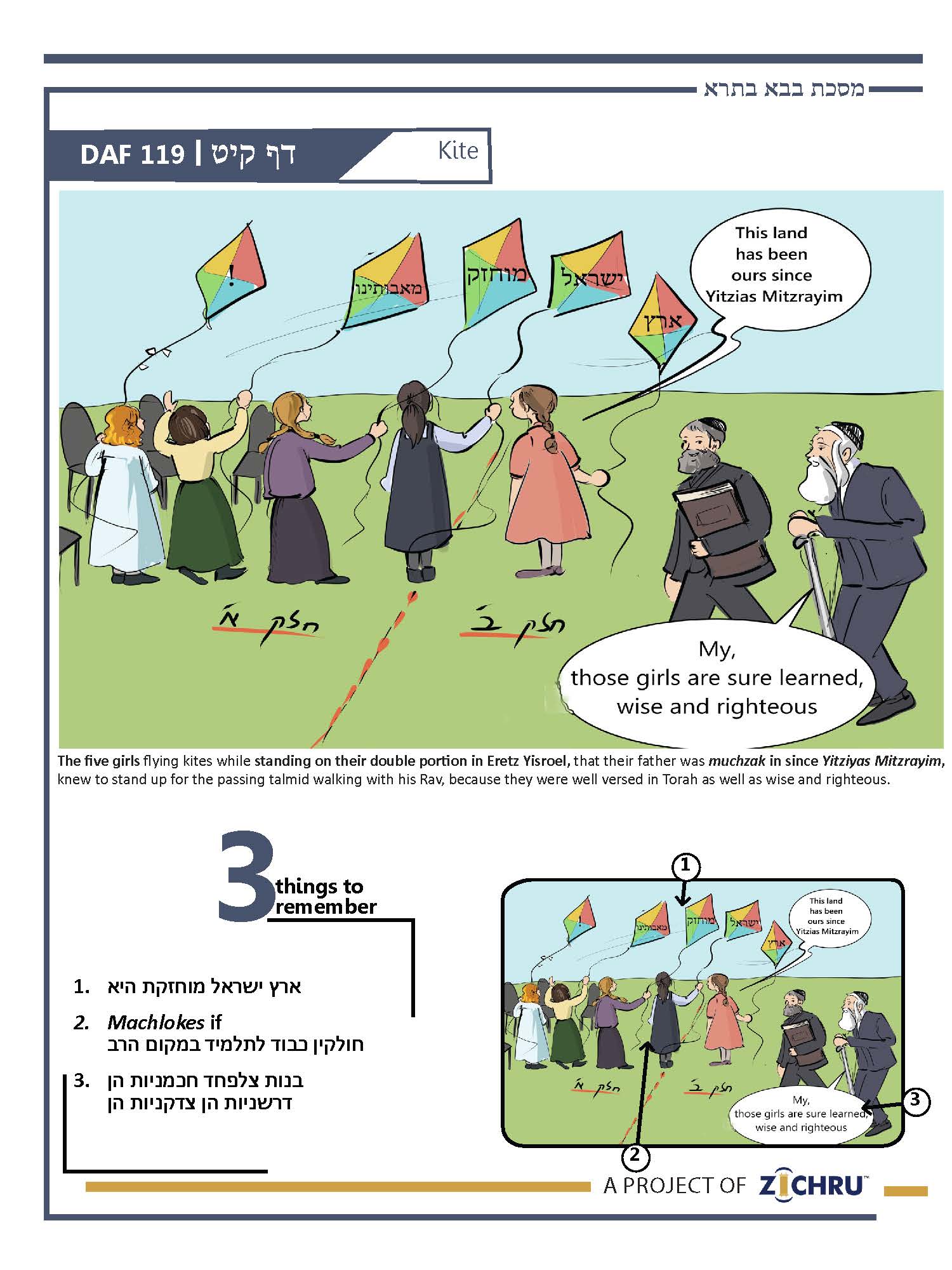Bava Basra - Daf 119
- ארץ ישראל מוחזקת היא
The Mishnah on Daf 116b taught that בנות צלפחד received their father’s double portion of his father חפר’s estate, because צלפחד was a bechor. The Gemara asks that this share was ראוי – potential assets, since חפר never entered Eretz Yisroel, ואין הבכור נוטל בראוי כבמוחזק – and a bechor does not take a double portion in his father’s potential assets as he does in possessed assets!? Rabbah ultimately answers: ארץ ישראל מוחזקת היא – Eretz Yisroel is considered already possessed by those who left Mitzrayim, so a bechor would receive a double portion in his father’s share. A Baraisa teaches that although Moshe Rabbeinu knew the בנות צלפחד were entitled to inherit their father, he was uncertain if they receive the bechor’s double portion. The Gemara explains that he was uncertain if ארץ ישראל מוחזקת היא, based on the passuk telling those leaving Mitzrayim they would receive Eretz Yisroel as "מורשה" – a heritage. Moshe was uncertain if this meant ירושה היא לכם מאבותיכם – it is an inheritance to you from your forefathers (and considered in their possession), or if it only meant שמורישין ואינן יורשין – that they will bequeath it but not inherit it themselves, because they would not enter Eretz Yisroel.
- Machlokes if חולקין כבוד לתלמיד במקום הרב
The passuk says the בנות צלפחד stood to make their claim “before Moshe, before Elazar HaKohen, before the נשיאים, and before the entire assembly.” The Gemara asks about this order, is it possible that they asked Moshe, and then Elazar, and they did not answer their question, and then went to the נשיאים and then the rest of the assembly for an answer? How could Elazar know what Moshe did not? And how would the נשיאים or the assembly know what Elazar did not? Rather, Rebbe Yoshiyah says, סרס המקרא ודרשהו – reverse the order of the passuk and darshen it, as if it says that they stood before Moshe, after having stood before Elazar, after having stood before the נשיאים, after having stood before the assembly. Rebbe Eliezer says that all of them were sitting together in the Beis Medrash, and they posed the question to all of them together. The Gemara explains they argue if חולקין כבוד לתלמיד במקום הרב – we accord honor to a student before [his] teacher. The halachah is that we do accord honor to a talmid before his Rebbe, but only דפליג ליה רביה יקרא – where his Rebbe accords him honor, indicating approval of his talmid being honored.
- בנות צלפחד חכמניות הן דרשניות הן צדקניות הן
A Baraisa states: בנות צלפחד חכמניות הן דרשניות הן צדקניות הן – the daughters of צלפחד were wise, they were expounders of the Torah, and they were righteous. They were wise, שלפי שעה דברו – because they spoke at the right time. Rav Shmuel bar Yitzchak says that Moshe was teaching the laws of יבום, and the בנות צפלחד argued that if they are considered like a son insofar as their mother is exempt from יבום, they should also inherit their father. If they are not like a son to inherit, their mother should be subject to יבום. They were דרשניות, because their wording implied: אילו היה [לו] בן לא דברנו – “If [our father] would have had a son, we would not have spoken,” because they recognized that a son inherits before a daughter. They were righteous, שלא נישאו אלא להגון להן – because they married only men befitting them. Although they were permitted to marry men from other shevatim (unlike the other women of their generation), they all married men of their father’s family, and even the youngest of them waited until forty years old for a fitting husband. Although Rav Chisda said that one will not bear children after waiting so long, they merited a miracle because of their righteousness.
Siman – Kite
The five girls flying kites while standing on their double portion in Eretz Yisroel, that their father was muchzak in since Yitziyas Mitzrayim, knew to stand up for the passing talmid walking with his Rav, because they were well versed in Torah as well as wise and righteous.


